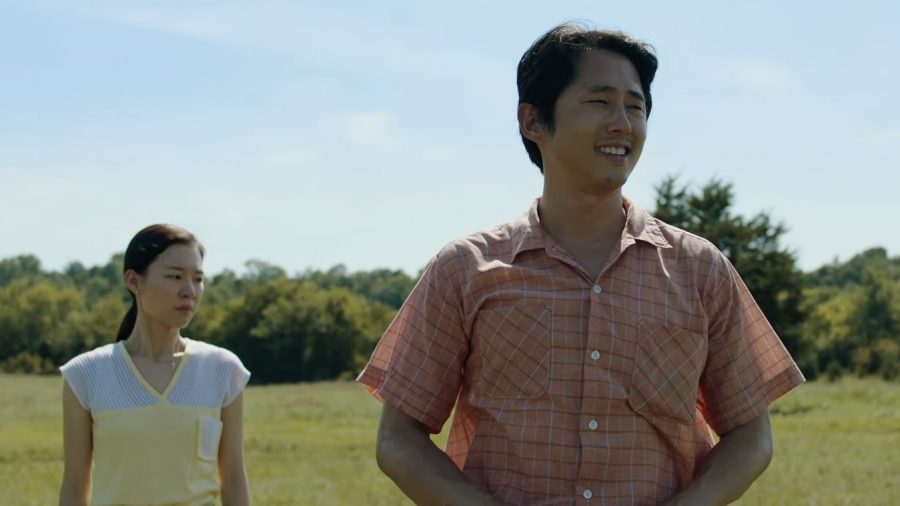“Minari,” an autobiographical film directed by Lee Isaac Chung, has been heralded as a simultaneously “universal” and “Korean-American” film about a man and his family trying to build a life in rural Arkansas. The film was released on Feb. 26, 2021.
When Golden Globe nominations were announced last month, early viewers of “Minari” were shocked to hear not only that the film was absent from the “Best Picture” category but was only nominated in the Foreign Film category — despite being filmed in America, directed by a Korean-American and starring a majority-American cast. The Golden Globes defended their stance on categorizing “Minari” as a foreign film, because more than 50% of the film is spoken in Korean rather than English. However, critics have retorted that Quentin Tarantino’s “Inglourious Basterds” was nominated for four Golden Globe categories back in 2009, despite more than half of its scenes being spoken in French and German.
The story of “Minari” revolves around the “American dream,” as hopeful immigrants try to build a new life for themselves and their family — what could be foreign about that? “Minari” ended up winning regardless of criticism and adversity, something the main characters face all too well.
The film begins as Jacob Yi (Steven Yeun) moves from California with his family onto their new plot of land in rural Arkansas, hoping to grow and sell Korean produce. Against tradition in that area and his need for water for his crops, he declines the help of a “water diviner” — someone who is able to “feel” for a water source — and digs a well in a spot he finds on his own.
While Jacob is optimistic about the future, he and his wife Monica have to work a second job because of their son David’s heart condition, as Monica’s mother Soon-ja moves in to watch the children.
Their son, forced to share a room with his grandmother, avoids her because she does not fulfill his idea of how a grandmother should be. After all, Soon-ja uses foul language when playing card games, does not cook and “smells like Korea,” as he says. Despite her grandson’s rude remarks, she tries her best to bond with the children.
Eventually the well runs dry, and other issues arise that threaten Jacob and Monica’s marriage.
Soon-ja takes the children to a nearby creek to plant minari (known as water celery) seeds from Korea. Soon-ja tells David and Anne how resilient the plant is, and predicts that they will grow well in this new environment. Later on, Soon-ja plays with David, bandages his wounds and helps him sleep, and he grows to accept and love her.
Overnight, Soon-ja suffers a stroke. Though she survives with medical treatment, she is impaired in movement and communication. While Jacob, Monica, David and Anne head to Oklahoma City for David’s cardiology appointment, they also meet a vendor for Jacob’s produce. There’s good news all around: David’s heart condition has improved and the Korean grocer agrees to selling his produce.
However, through Jacob’s actions that day, like bringing the produce into the building instead of leaving them in the hot car, Monica argues with him that he cares more about the farm than his family. Following an incredibly emotional argument that hushes the audience, Jacob and Monica agree to go their separate ways.
While they were in Oklahoma City, things were not “ok” at home. Soon-ja accidentally set the barn containing produce on fire. As they drive back, they can smell the smoke. Jacob rushes in to save the crops, and Monica tries to help him.
Confused and guilty, Soon-ja begins to walk a path away from the farm towards the woods, but Anne and David reassure her to come back to the house. The most significant thing about this scene is that David runs to his grandmother — despite his heart condition — showing how much he cares for her.
Later, Jacob and Monica decide to hire the water diviner to find a spot for the well. They leave a stone on the mark, a symbol of how they have planted themselves firmly in Arkansas, together. In the final scene, Jacob and David head to the creek to harvest the minari that Soon-ja had planted; despite being in a completely new environment, the minari is thriving.
The film is rich in metaphor. The minari itself represents the growth of their family in a foreign land, just as they planted the seeds near the creek. Jacob and Monica’s qualms over what to prioritize — their farm or their family — were quelled during moments of crisis. When Jacob chooses the farm to provide for his family, Monica chooses Jacob when she helps save some crates of produce. As the fire grows out of control, the two save each other from the smoke, narrowly escaping the burning barn.
The cinematography is just as striking, with poignant shots of David standing in the middle of the field as the sun shines, Anne making food while the rest of the family is in the background or of Jacob driving his tractor. The shots are beautiful enough to have you wishing you were also out in the fields, breathing in the fresh air. When the barn burns down, warm, sepia tones give way to colder ones. Though the movie is mostly spoken in Korean, all of the scenes carry rich emotion that isn’t lost in translation.
The acting was so raw and genuine that I often forgot I was watching a film, until my friend would murmur under their breath “wow, they’re great actors” and I was snapped back to reality, whisked out of Jacob’s fields in Arkansas just as quickly as I was pulled into it. Steven Yeun has been nominated for Best Actor in a Leading Role for the Screen Actors Guild Awards, and the rest of the cast has also been nominated for Best Cast in a Motion Picture. Yuh-Jung Youn, who perfectly played the feisty and dynamic grandmother, was selected by Palm Springs International Film Festival to be the recipient of the 2021 Spotlight Award, Actress.
The nominations are well-earned. Although the film is not specific to the Asian American experience (rather, it is more focused on what it means to be a struggling family), from a sociocultural standpoint, “Minari” comes at a perfect time for the Asian American community. Following the worldwide success of Korean-produced film “Parasite,” directed by masterful Bong Joon-ho, and the rising cases of violent attacks of Asians all around the world, it brings into question: where do Asian Americans and descendants of the diaspora really stand in the western world?
The nomination of “Minari” as foreign is a big f–– you to Asian Americans and immigrants alike. It is a reminder that in spite of where we come from and where we are born, those within the Asian community in America will always be denoted as an oriental, an immigrant or perpetual foreigner. Despite being inspired by Lee Isaac Chung’s own childhood in Arkansas, his memories are apparently not American enough to be nominated for any category other than foreign.
Chung’s film is heartfelt and about trying to build a new life for your family against all odds, about trying to become better parents, to become more forgiving and understanding people, to take chances in spite of loss and love and to place faith in those around you as well as yourself.















